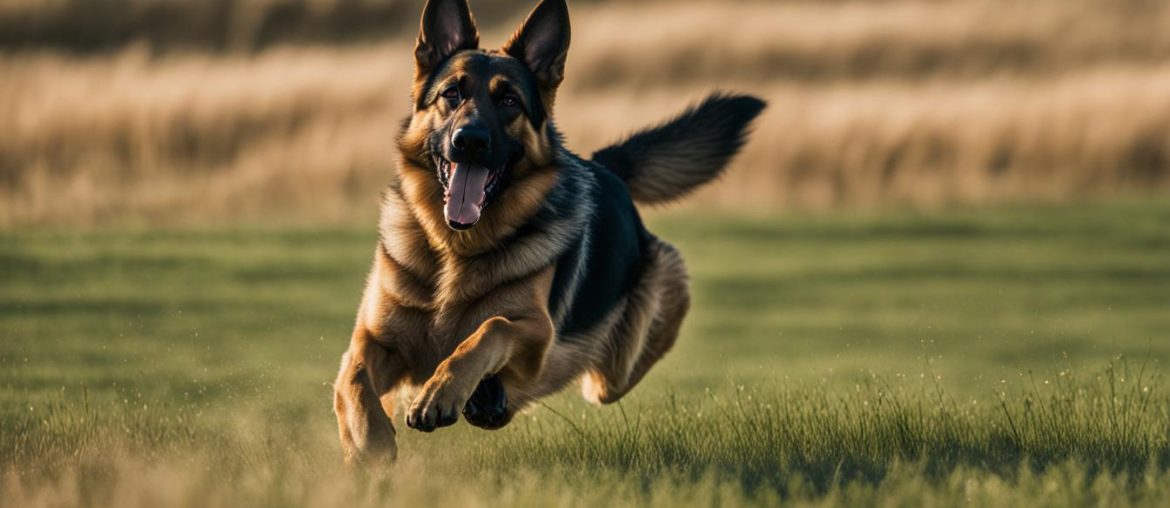German Shepherds are renowned for their impressive speed and agility. As one of the fastest dog breeds, they have the ability to reach a top speed of about 30 miles per hour. This makes them a formidable force when it comes to chasing down targets or covering long distances.
Key Takeaways:
- German Shepherds can run at speeds of approximately 30 miles per hour.
- Their speed is a result of their long legs, muscular build, and high stamina.
- German Shepherds are frequently used in working roles such as police and military work due to their speed and agility.
- Proper training, nutrition, and care are essential for maintaining their speed and overall well-being.
- German Shepherds continue to be cherished as loyal companions and valuable assets in various fields.
The Influence of Breed Characteristics on Speed
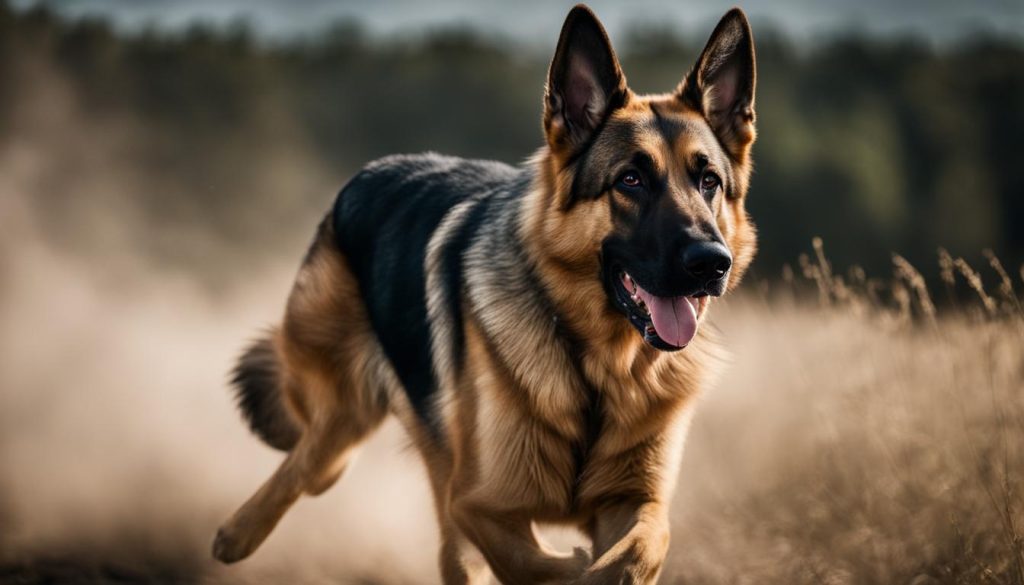
When it comes to the speed of German Shepherds, several factors come into play. Their breed characteristics play a significant role in their ability to reach impressive speeds and maintain agility while running.
German Shepherds are known for their long legs and muscular build, which allows them to generate power and maintain balance while running. These physical traits give them an advantage in terms of speed.
Furthermore, German Shepherds have high endurance, enabling them to sustain their speed for extended periods. This is particularly beneficial in situations that require prolonged running or chasing.
In addition to their physical attributes, German Shepherds also possess remarkable intelligence and spatial reasoning skills. These mental abilities help them navigate obstacles and find the most efficient routes, further enhancing their speed and agility.
Lastly, proper care plays a crucial role in maintaining a German Shepherd’s speed and overall physical condition. A healthy diet, rich in nutrients, ensures that they receive the necessary fuel to perform at peak levels. Adequate rest is equally important as it allows their bodies to recover and rejuvenate, contributing to their speed and endurance.
Overall, the breed characteristics, high endurance, intelligence, and proper care collectively influence the speed and agility of German Shepherds, making them one of the fastest and most versatile dog breeds.
German Shepherds in Working Roles
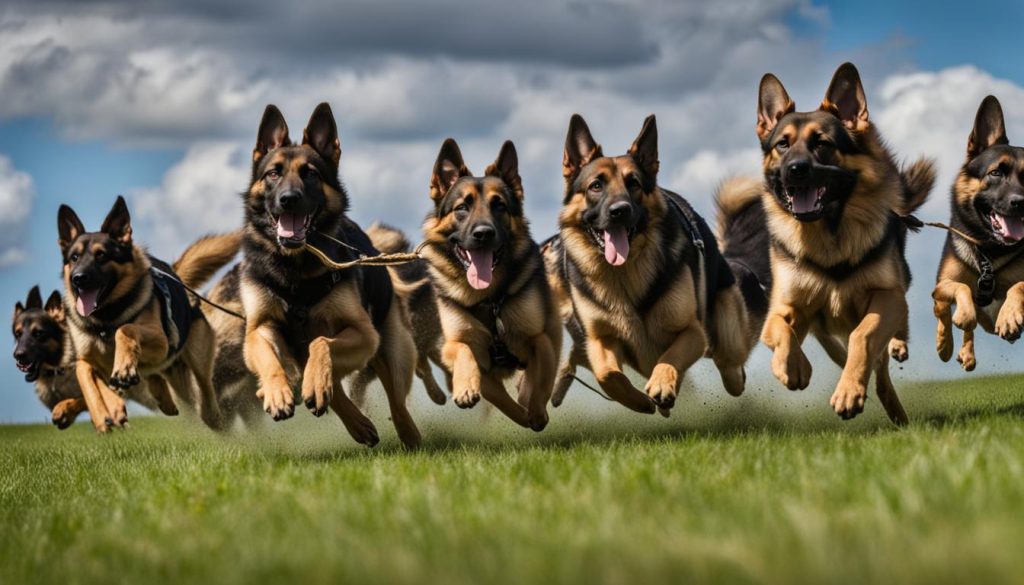
German Shepherds are highly valued in various working roles due to their speed and versatility. They are commonly used in police work, military operations, as service animals, and as guard dogs.
“German Shepherds’ natural protective instincts and speed enable them to effectively carry out tasks in these important working roles.”
In police work, German Shepherds are utilized for their speed and agility in apprehending suspects. Their ability to quickly chase down individuals and navigate challenging environments makes them invaluable assets in law enforcement.
Similarly, German Shepherds play a key role in military operations. Their speed and versatility allow them to assist in a variety of tasks, including tracking, search and rescue, and providing security.
Furthermore, German Shepherds excel as service animals, assisting individuals with disabilities. Their intelligence, trainability, and speed enable them to perform tasks such as guiding the visually impaired and providing support to those with mobility challenges.
Lastly, German Shepherds are often chosen as guard dogs due to their protective instincts and speed. They can quickly respond to potential threats, deterring trespassers and providing a sense of security.
Overall, German Shepherds’ speed, agility, and adaptability make them the ideal choice for various working roles. Whether it’s in police work, military operations, as service animals, or as guard dogs, German Shepherds consistently prove their value and effectiveness.
German Shepherd Speed vs. Other Dog Breeds
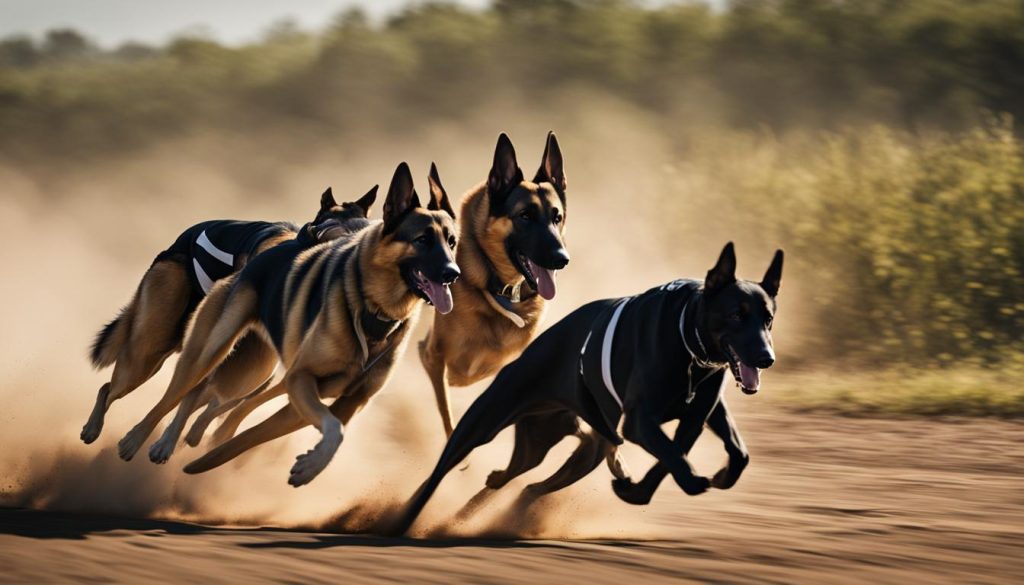
German Shepherds are renowned for their speed and agility, but when it comes to pure speed, they are not the fastest dog breed. The Greyhound, known for its exceptional speed, outpaces the German Shepherd with its ability to reach speeds of up to 45 miles per hour. Similarly, the Whippet, a smaller breed resembling the Greyhound, showcases impressive speed capabilities, reaching speeds of up to 35 miles per hour.
Although German Shepherds may not be the absolute fastest, they still rank among the top breeds in terms of speed. Their ability to accelerate quickly and maintain a consistent pace sets them apart from many other dog breeds. German Shepherds’ swift speed combined with their intelligence and agility make them well-suited for various tasks and working roles.
To better understand the speed comparison, let’s take a closer look at the speeds of German Shepherds, Greyhounds, and Whippets:
| Breed | Top Speed (mph) |
|---|---|
| German Shepherd | Approximately 30 mph |
| Greyhound | Up to 45 mph |
| Whippet | Up to 35 mph |
As seen in the table, Greyhounds hold the title for the fastest breed, while German Shepherds and Whippets showcase impressive speeds as well. Each breed possesses unique attributes that contribute to their overall speed capabilities.
The image above captures the grace and agility of a German Shepherd running alongside a Greyhound. It visually represents the speed comparison between the two breeds and highlights their distinct physical characteristics.
Training German Shepherds for Speed
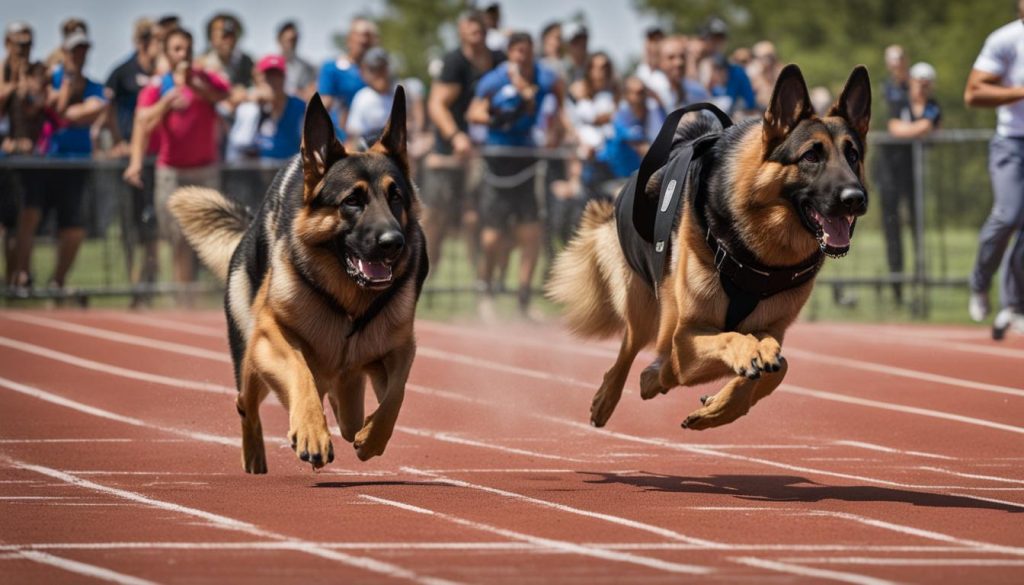
To enhance a German Shepherd’s speed, proper training is essential. Starting with gradual exercise, such as jogging or running, can help build their endurance and pace. It’s important to start slowly and gradually increase the intensity and duration of the exercise to avoid strain or injury. Providing them with ample opportunities for play and mental stimulation can also contribute to their overall speed and agility. Incorporating obstacle courses or agility training can further enhance their speed and maneuverability.
German Shepherds are athletic dogs that require regular exercise to keep them physically and mentally fit. Running is an excellent exercise for German Shepherds, as it helps them burn off excess energy and maintain a healthy weight. When running with your German Shepherd, ensure that you choose safe and suitable routes, free from hazards such as steep inclines or rough terrain.
Before starting a running routine with your German Shepherd, it’s important to ensure they are physically ready for the activity. Begin by gradually increasing the duration and intensity of the runs, giving their bodies time to adapt. Always warm up and cool down with a brisk walk to prevent muscle strain and injury.
In addition to running, incorporate other forms of exercise into your German Shepherd’s routine. Activities such as fetch, playing with interactive toys, and participating in agility courses can help improve their speed, coordination, and overall fitness. Mental stimulation through obedience training and puzzle toys is also crucial for their development.
Remember to pay attention to your German Shepherd’s body language and adjust their exercise routine accordingly. If they show signs of fatigue or are struggling to keep up pace, it’s important to take a break and allow them to rest. Overexertion can lead to injuries or exhaustion, so always prioritize their well-being.
Consistency is key when training German Shepherds for speed. Regular exercise and mental stimulation will not only improve their physical performance but also create a stronger bond between you and your furry companion. Enjoy the journey of training and watching your German Shepherd thrive!
Physical Factors Affecting German Shepherd Speed
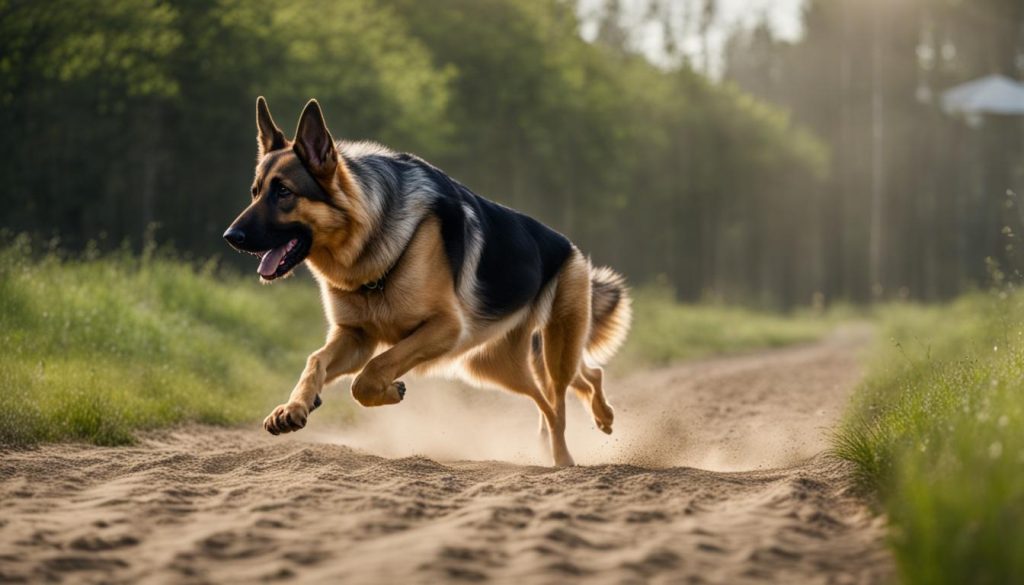
German Shepherds are known for their impressive speed and agility. However, certain physical factors can affect their ability to maintain their top speed. Two common health issues that can impact their speed are hip dysplasia and vision loss.
Hip Dysplasia in German Shepherds
Hip dysplasia is a condition that affects the hip joints, causing them to develop improperly. This can result in pain and difficulty in movement, making it challenging for German Shepherds to run at high speeds. The condition is more prevalent in large breeds like German Shepherds.
To manage hip dysplasia and minimize its impact on speed, regular veterinary check-ups are essential. Early detection allows for effective management strategies, which may include physical therapy, pain medications, or, in severe cases, surgery.
Vision Loss in German Shepherds
Vision loss can also affect a German Shepherd’s speed and agility. Reduced visual acuity can impair their spatial awareness, hindering their ability to navigate obstacles and maintain their balance during high-speed running.
Regular eye exams, conducted by a veterinary ophthalmologist, can help identify any vision impairments. Although vision loss in German Shepherds cannot be reversed, there are management strategies that can improve their quality of life and allow them to maintain their speed. These strategies may include environmental modifications, such as removing potential hazards, and providing alternative forms of mental and physical stimulation to compensate for the loss of sight.
It is important to note that not all German Shepherds will develop hip dysplasia or experience vision loss. Proper care, including regular exercise, a balanced diet, and routine veterinary care, can help prevent or manage these health issues, ensuring that German Shepherds can maintain their speed and overall well-being.
| Health Issue | Affected Aspect | Management Strategies |
|---|---|---|
| Hip Dysplasia | Movement and speed | Regular veterinary check-ups, physical therapy, pain medications, surgery (in severe cases) |
| Vision Loss | Spatial awareness and agility | Regular eye exams, environmental modifications, alternative mental and physical stimulation |
The Role of Diet and Rest in Maintaining Speed

A well-balanced diet plays a crucial role in maintaining the speed and overall physical condition of German Shepherds. Providing them with a high-quality diet that includes a sufficient amount of protein is key to supporting their muscle development and energy levels. Protein is essential for repairing and building muscles, enabling German Shepherds to perform at their best.
In addition to a nutritious diet, adequate rest and sleep are equally important for German Shepherds to maintain their speed and endurance. Rest allows their bodies to recover from physical activity and prevent fatigue. It is during restful periods that their muscles and joints repair themselves, ensuring they are ready to exert their maximum speed and agility when needed.
Proper nutrition and rest also contribute to the overall health and well-being of German Shepherds, reducing the risk of injuries and maintaining their peak performance. As active and energetic dogs, German Shepherds require a well-balanced diet and adequate rest to support their demanding physical activities.
When designing a diet for a German Shepherd focused on speed, it is important to consult with a veterinarian or canine nutritionist to ensure that their nutritional needs are met. They can provide expert advice on the specific dietary requirements and protein intake suitable for German Shepherds. Additionally, regular check-ups with a veterinarian are essential to monitor their overall health and make any necessary adjustments to their diet or rest routine.
The Versatility of German Shepherds
German Shepherds are not only known for their speed but also their versatility. These intelligent and agile dogs excel in various dog competitions, demonstrating their ability to navigate challenging courses with precision and speed.
Their athleticism, combined with their natural obedience, makes them well-suited for competitive sports such as agility trials and obedience trials. German Shepherds consistently impress judges with their speed, agility, and ability to perform complex tasks with ease.
Moreover, German Shepherds play a crucial role in search and rescue operations. Their exceptional speed and agility enable them to cover rugged terrains efficiently, allowing them to locate missing individuals more effectively. These dogs are trained to use their keen sense of smell and acute hearing in combination with their speed to find and rescue people in various search and rescue scenarios.
German Shepherds’ versatility extends beyond their working roles. They also make wonderful companions and family pets. These loyal and loving dogs are known for their protective nature and their ability to form strong bonds with their owners and families. German Shepherds thrive in environments where they are given plenty of opportunities for exercise, mental stimulation, and training.
| German Shepherds in Dog Competitions | German Shepherds in Search and Rescue |
|---|---|
| Excel in agility trials and obedience trials | Efficiently navigate challenging terrain |
| Showcase speed, agility, and obedience | Utilize keen sense of smell and acute hearing |
| Perform complex tasks with ease | Locate missing individuals more effectively |
The Historical Significance of German Shepherds
German Shepherds have a fascinating history and hold great cultural significance. Originally bred in Germany by Max von Stephanitz, these dogs were specifically developed to be versatile working dogs. Von Stephanitz’s vision led to the creation of a breed that excels not only in physical capabilities but also in intelligence and loyalty.
German Shepherds quickly gained popularity and became widely recognized as a symbol of Germany throughout the 20th century. Their association with the country is a testament to their remarkable traits and contributions. Their intelligence, loyalty, and speed captured the admiration and respect of people worldwide.
To this day, German Shepherds continue to be cherished for their exceptional qualities. They are highly valued as working dogs in various fields, including police and military work. Their speed and agility make them invaluable assets in these roles, where quick responses and relentless pursuit are essential.
German Shepherds are revered not only for their working abilities but also as beloved companions. Their gentle and loving nature, combined with their unwavering loyalty, has made them popular family pets.
Tips for Owning a German Shepherd
Owning a German Shepherd requires commitment and proper care. These intelligent and energetic dogs thrive in an environment that provides them with plenty of mental and physical stimulation. Here are some tips to ensure a happy and healthy German Shepherd:
Exercise Requirements
German Shepherds have high energy levels and require regular exercise to keep them physically and mentally fit. Aim for at least an hour of exercise each day, which can include brisk walks, jogging, or playing fetch. Engaging in activities such as agility training or hiking can also provide additional mental stimulation and help satisfy their natural instincts.
Training and Socialization
Training is crucial for German Shepherds to become well-behaved and obedient companions. Start training at an early age and be consistent with commands and positive reinforcement techniques. Attending obedience classes or working with a professional dog trainer can be beneficial for both you and your German Shepherd. Socialization is also important to expose them to different environments, people, and animals, promoting their confidence and good behavior.
Provide Mental Stimulation
German Shepherds are intelligent dogs that need mental stimulation to prevent boredom and destructive behavior. Incorporate interactive toys, puzzle games, and training sessions into their daily routine. Teaching them new commands, tricks, or participating in canine sports such as agility or scent work can keep their minds sharp and engaged.
Establish Strong Leadership
German Shepherds thrive under strong leadership and a consistent pack hierarchy. Establish yourself as the pack leader by setting clear rules, boundaries, and expectations. Consistency in enforcing rules and providing structure will help them feel secure and prevent any potential behavioral issues.
Proper Diet and Nutrition
A well-balanced diet is essential for your German Shepherd’s overall health and vitality. Consult with your veterinarian to determine the best diet plan for your dog’s specific needs based on factors such as age, activity level, and any dietary restrictions. High-quality dog food that is rich in protein, vitamins, and minerals will help support their muscle development and maintain their optimal weight.
Maintain Regular Veterinary Care
Regular check-ups with your veterinarian are vital to ensure your German Shepherd’s well-being. Schedule annual vaccinations, preventive treatments for parasites, and dental cleanings. Routine health examinations can detect any potential health issues early on and provide appropriate treatment if needed.
By following these tips for owning a German Shepherd, you can provide them with the love, care, and structure they need to live a happy and fulfilling life.
Wrapping Up
German Shepherds are remarkable dogs when it comes to speed, capable of reaching top speeds of around 30 miles per hour. Their long legs and muscular build contribute to their agility, making them one of the fastest dog breeds. This impressive speed, combined with their intelligence, makes German Shepherds highly sought after for various working roles, such as in police and military work.
Proper training, nutrition, and care are essential to maintain the speed and overall well-being of German Shepherds. They require regular exercise to meet their high energy needs, and a balanced diet with sufficient protein to support their muscle development and energy levels. Adequate rest is equally important, allowing their bodies to recover and perform at their peak.
German Shepherds are not only valued for their speed but also for their versatility. They excel in dog competitions, showcasing their agility, speed, and obedience. They are also highly effective in search and rescue operations, thanks to their speed and agility in navigating challenging terrain.
To sum up, German Shepherds are loyal companions and invaluable assets in various fields. With their impressive speed capabilities, they continue to hold a special place in the hearts of dog lovers worldwide.
FAQ
How fast can a German Shepherd run?
German Shepherds can reach a top speed of about 30 miles per hour.
What factors contribute to the speed of a German Shepherd?
German Shepherds’ long legs, muscular build, high stamina, intelligence, and focus contribute to their speed.
In what working roles are German Shepherds commonly used?
German Shepherds are commonly used in police work, military work, as service animals, and as guard dogs.
How does the speed of German Shepherds compare to other dog breeds?
While German Shepherds are fast, they are not the fastest. Greyhounds can reach speeds of up to 45 miles per hour, and Whippets can reach speeds of up to 35 miles per hour.
How can you train a German Shepherd to enhance its speed?
Gradual exercise, play, mental stimulation, and agility training can enhance a German Shepherd’s speed and agility.
What health issues can impact the speed of a German Shepherd?
Health issues such as hip dysplasia and vision loss can impact a German Shepherd’s speed.
How does diet and rest affect a German Shepherd’s speed?
Proper nutrition, including a high-quality diet with adequate protein, and sufficient rest are important for maintaining a German Shepherd’s speed and overall physical condition.
How versatile are German Shepherds?
German Shepherds are highly versatile, excelling in various working roles, dog competitions, and search and rescue operations.
What is the historical significance of German Shepherds?
German Shepherds were originally bred in Germany by Max von Stephanitz and became a symbol of the country. They are highly regarded for their intelligence, loyalty, and speed.
What tips are there for owning a German Shepherd?
Owning a German Shepherd requires commitment, including regular exercise, mental stimulation, and consistent training.


